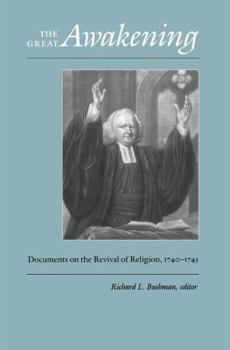The Great Awakening: Documents on the Revival of Religion, 1740-1745
Select Format
Select Condition 
Book Overview
Most twentieth-century Americans fail to appreciate the power of Christian conversion that characterized the eighteenth-century revivals, especially the Great Awakening of the 1740s. The common disdain in this secular age for impassioned religious emotion and language is merely symptomatic of the shift in values that has shunted revivals to the sidelines.
The very magnitude of the previous revivals is one indication of their importance. Between 1740 and 1745 literally thousands were converted. From New England to the southern colonies, people of all ages and all ranks of society underwent the New Birth. Virtually every New England congregation was touched. It is safe to say that most of the colonists in the 1740s, if not converted themselves, knew someone who was, or at least heard revival preaching.
The Awakening was a critical event in the intellectual and ecclesiastical life of the colonies. The colonists' view of the world placed much importance on conversion. Particularly, Calvinist theology viewed the bestowal of divine grace as the most crucial occurrence in human life. Besides assuring admission to God's presence in the hereafter, divine grace prepared a person for a fullness of life on earth. In the 1740s the colonists, in overwhelming numbers, laid claim to the divine power which their theology offered them. Many experienced the moral transformatoin as promised. In the Awakening the clergy's pleas of half a century came to dramatic fulfillment.
Not everyone agreed that God was working in the Awakening. Many believed preachers to be demagogues, stirring up animal spirits. The revival was looked on as an emotional orgy that needlessly disturbed the churches and frustrated the true work of God. But from 1740 to 1745 no other subject received more attention in books and pamphlets.
Through the stirring rhetoric of the sermons, theological treatises, and correspondence presented in this collection, readers can vicariously participate in the ecstasy as well as in the rage generated by America's first national revival.
The very magnitude of the previous revivals is one indication of their importance. Between 1740 and 1745 literally thousands were converted. From New England to the southern colonies, people of all ages and all ranks of society underwent the New Birth. Virtually every New England congregation was touched. It is safe to say that most of the colonists in the 1740s, if not converted themselves, knew someone who was, or at least heard revival preaching.
The Awakening was a critical event in the intellectual and ecclesiastical life of the colonies. The colonists' view of the world placed much importance on conversion. Particularly, Calvinist theology viewed the bestowal of divine grace as the most crucial occurrence in human life. Besides assuring admission to God's presence in the hereafter, divine grace prepared a person for a fullness of life on earth. In the 1740s the colonists, in overwhelming numbers, laid claim to the divine power which their theology offered them. Many experienced the moral transformatoin as promised. In the Awakening the clergy's pleas of half a century came to dramatic fulfillment.
Not everyone agreed that God was working in the Awakening. Many believed preachers to be demagogues, stirring up animal spirits. The revival was looked on as an emotional orgy that needlessly disturbed the churches and frustrated the true work of God. But from 1740 to 1745 no other subject received more attention in books and pamphlets.
Through the stirring rhetoric of the sermons, theological treatises, and correspondence presented in this collection, readers can vicariously participate in the ecstasy as well as in the rage generated by America's first national revival.
Format:Paperback
Language:English
ISBN:0807842605
ISBN13:9780807842607
Release Date:January 1989
Publisher:Omohundro Institute and Unc Press
Length:192 Pages
Weight:0.75 lbs.
Dimensions:0.6" x 6.0" x 9.0"
Customer Reviews
2 ratings
Primary Sources Documenting the Great Awakening
Published by Thriftbooks.com User , 18 years ago
I am doing a paper on the preaching of Whitefield and Edwards during the Great Awakening, so I almost jumped for joy when this book came in the mail! Here you have theological treatises and tracts and narratives from revivalists who witnessed the tremendous workings of God during the time of the TransAtlantic religious revivals. You have Samuel Blair's faithful narrative of the revival in 1744 Pennsylvania, George Whitefield's eyewitness reports from his journals, and even some of the anti-revival literature of Charles Chauncey. You also have the regrettable reports of the extremism encouraged by James Davenport as well as some of Jonathan Edwards' later reflections. The bottom line is that this is a treasure trove of primary source data about the years of revival in the colonies. A must have for those interested in this era of history.
great documents
Published by Thriftbooks.com User , 19 years ago
This book is put together well; the documents are in a good order that helps give the reader an overview of the Great Awakening. As a Christian, the documents are inspiring and interesting because some of them give a glimpse of people who were fervent for and enjoying the Lord. The freshness of their contact with the Lord as seen in these primary sources is similar to our fresh experiences of the Lord today!





